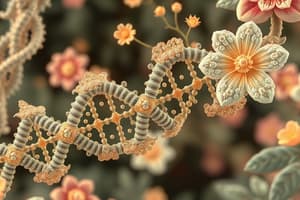Podcast
Questions and Answers
What is the function of promoters in transcriptional regulation?
What is the function of promoters in transcriptional regulation?
- Recruit RNA polymerase to initiate transcription (correct)
- Add methyl groups to CpG islands
- Inhibit gene expression
- Bind to specific DNA sequences to regulate gene expression
What is the result of DNA methylation on gene expression?
What is the result of DNA methylation on gene expression?
- Increase in gene expression
- Alteration of chromatin structure
- No effect on gene expression
- Decrease in gene expression (correct)
What is the function of microRNAs (miRNAs)?
What is the function of microRNAs (miRNAs)?
- To remove introns and join exons
- To bind to DNA and regulate gene expression
- To recruit RNA polymerase to initiate transcription
- To bind to mRNA and prevent translation (correct)
What is the main function of chromatin remodeling?
What is the main function of chromatin remodeling?
What is the role of RNA-binding proteins (RBPs)?
What is the role of RNA-binding proteins (RBPs)?
What is the result of RNA interference (RNAi)?
What is the result of RNA interference (RNAi)?
Flashcards are hidden until you start studying
Study Notes
Transcriptional Regulation
- Transcription factors: Proteins that bind to specific DNA sequences to regulate gene expression
- Enhancers: DNA sequences that loop back to the promoter to increase transcription
- Promoters: DNA sequences that recruit RNA polymerase to initiate transcription
- Repressors: Transcription factors that inhibit gene expression by binding to operators
Epigenetic Regulation
- DNA methylation: Addition of methyl groups to CpG islands, typically leading to gene silencing
- Histone modification: Covalent modification of histone proteins to alter chromatin structure and accessibility
- Chromatin remodeling: ATP-dependent alteration of chromatin structure to facilitate or inhibit transcription
Post-Transcriptional Regulation
- RNA splicing: Removal of introns and joining of exons to form mature mRNA
- Alternative splicing: Generation of different mRNA isoforms from a single gene
- MicroRNAs (miRNAs): Small RNAs that bind to mRNA, preventing translation
- RNA-binding proteins (RBPs): Proteins that regulate mRNA stability, localization, and translation
Gene Silencing
- RNA interference (RNAi): Double-stranded RNA-mediated degradation of specific mRNA molecules
- Gene silencing by siRNAs: Small interfering RNAs that target specific mRNAs for degradation
- Epigenetic gene silencing: Heritable silencing of gene expression through epigenetic modifications
Cellular Regulation
- Cell signaling: Signaling pathways that regulate gene expression in response to environmental cues
- Hormone regulation: Hormones that regulate gene expression by binding to specific receptors
- Tissue-specific gene expression: Regulation of gene expression in specific cell types or tissues
Studying That Suits You
Use AI to generate personalized quizzes and flashcards to suit your learning preferences.




